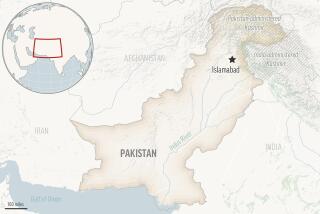Pakistan plans to fence and mine border
ISLAMABAD, PAKISTAN — Under growing pressure from the Bush administration and NATO to stem the cross-border movement of Taliban fighters, Pakistan announced Tuesday that it would construct a fence and plant land mines along parts of its remote, rugged frontier with Afghanistan.
The measure was denounced by the Afghan government, and some analysts questioned whether it would be practical.
Pakistani Foreign Secretary Riaz Khan, who unveiled the plan, did not say how much of the 1,500-mile-long frontier would be affected or when the work would begin.
“In keeping with our policy to prevent any militant activity from Pakistan inside Afghanistan, the Pakistan army has been tasked to work out modalities for selectively fencing and mining the Pakistan-Afghanistan border,” he told reporters in Islamabad, the Pakistani capital.
Khan also said additional paramilitary forces would be deployed along the frontier but did not say how many. About 80,000 Pakistani troops are currently stationed in border areas.
In Kabul, the Afghan capital, an aide to President Hamid Karzai was critical of the plan.
“Rather than beating around the bush, we must confront terrorists in a real manner.... The border is not where the problem lies,” Karzai spokesman Khaleeq Ahmad told the Associated Press.
Khan said the barrier and mines would be placed inside Pakistani territory and therefore Afghanistan’s consent was not needed.
Afghanistan and Pakistan have been quarreling sharply in recent weeks over which bears the greater responsibility for cross-border infiltration by Taliban fighters.
Karzai has accused Pakistan’s government of fomenting militancy and aiding the Islamic fundamentalist Taliban fighters; Pakistan has said the problem is that Karzai’s government has not effectively imposed the rule of law inside Afghanistan.
At least 4,000 people have died in fighting in Afghanistan during 2006, which has been the bloodiest year since the fall of the Taliban in late 2001. The insurgency has gained significant momentum in recent months, although North Atlantic Treaty Organization commanders say the rising toll is due in part to coalition troops’ aggressive pursuit of the militants.
The Afghan-Pakistani frontier, a British colonial-era line of demarcation that has never been recognized by Afghanistan, cuts through the homeland of Pashtun tribes, whose members are accustomed to traveling across it without border controls.
“There is long-standing migration that has nothing to do with war or fighters or Taliban,” said Shafqat Mehmood, a former Pakistani senator who is now a political analyst.
But fighters find the borderlands’ high mountain passes and empty deserts an ideal sanctuary.
Mehmood said Pakistan’s announcement was probably meant to counter international criticism aimed at President Pervez Musharraf over Pakistan’s role in the U.S.-declared war on terrorism.
Although Musharraf is an avowed ally of the Bush administration in the hunt for Taliban and Al Qaeda figures, Pakistan nurtured the Taliban in its early days, and the country’s intelligence service is believed to maintain links with the militia.
Pakistan’s government, which is under domestic pressure from Islamist parties as it heads into an election year, has tried negotiating with tribal chiefs to stem infiltration, to little effect.
Under a pact signed more than three months ago, Pakistani troops withdrew from tribal areas of the North Waziristan border region in return for a pledge by the chiefs to stop militants from crossing the border into Afghanistan to attack NATO troops. But Western commanders say infiltration from Pakistan has in fact increased.
Another complicating factor in Pakistan’s plan is that the systematic laying of land mines probably would trigger international protests.
Pakistan is not a signatory to the Mine Ban Treaty, a 1997 international accord that bans the use of antipersonnel land mines.
Pakistani authorities did not report any claim of responsibility for a car bombing outside the airport in the city of Peshawar. One man was killed and two people were wounded in the attack.
Peshawar, the capital of North-West Frontier Province, which borders Afghanistan, has been hit by a series of bombings in recent months, including an explosion in October that killed six people and wounded several dozen at a market.
The government describes the blasts as acts of terrorism but has not said whom it believes to be responsible.
Times staff writer King reported from Peshawar and special correspondent Zaidi from Islamabad.
More to Read
Sign up for Essential California
The most important California stories and recommendations in your inbox every morning.
You may occasionally receive promotional content from the Los Angeles Times.










